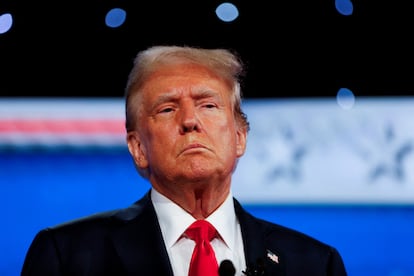Trump’s campaign ad
The Republican candidate managed to win because Biden was unable to keep up the hope that there is still room for a fight

The Republican candidate, Donald Trump, managed to finish the first debate without clearly answering any of the journalists’ direct and specific questions, or explaining a single proposal regarding what he will do if he wins the next election. His strategy of constantly attacking Joe Biden’s ability and results, labeling them as a disaster compared to his own term in office, as well as a stage presence with a clearly more dynamic body energy, have shown that, at least, Trump had a better strategy and perhaps came in better prepared than his opponent. Trump was there to make a long and repetitive campaign ad. Surely it was an effective one.
Trump also won the non-verbal debate. And the verbal one does not seem to have been won by Joe Biden, nor has the president managed to evidence the supposed dangers of Trump’s return to the White House. Biden’s halting delivery, when not downright lack of clarity ― and even confusion ― contributed to fueling the big initial question of this debate: Can Biden resist Trump’s onslaught and aggressiveness? He said he was here to stop him. But last night he didn’t prove that, even though he rallied back. Paradoxically, Trump looked like time was dragging out for him, while Biden seemed to stand the debate duration better.
The point of the debate that discussed the age of both candidates and their potential limitations to carry out “the hardest job in the world” was comical and ― almost― ridiculous. The debate about their cognitive abilities ended in a challenge to play golf, to show who has a better handicap. Both men offered an outdated, elitist image of idle retirees provoking each other to see who hits their club better and harder. In a CBS and YouGov poll, only 28% of voters considered Biden “strong,” compared to 66% who thought the same of Trump.
Joe Biden arrived at the debate after hardening the tone of his messages against Trump: his campaign invested $50 million in an ad that describes his rival as an “unhinged” individual who will do anything for power; meanwhile Kamala Harris and other Democratic spokespersons have emphasized the president’s ability to “fight.”
For the first time in several months, Biden has begun to lead voting intentions in some polls. His advantage, however, is small, it is not yet reflected in the swing states that will define the election, and the most recognized polling averages, such as Real Clear Politics, still show him lagging behind, although only by one point. The situation, however, is an improvement compared to the first five months of the year, and it reflects that Trump’s conviction in the only trial to take place before the election may have affected him among the most moderate voters.
Despite his weakening position in the polls and the possible setback among moderate voters, the ruling against Trump at the end of May has further mobilized his support base. His campaign has taken advantage of that momentum to increase fundraising, an aspect in which it had been lagging behind the Democratic party all year.
The debate will have confirmed the prejudices and foregone conclusions of each candidate’s hard-core voters. But it will have left the undecided voters feeling perplexed and immersed in many doubts about the meaning of their vote. Trump’s aggressiveness ― although at the debate he seemed less aggressive and showed himself as less dangerous ― may be his weakness. And Biden’s weakness may be his strength by showing traits of resistance that generate a bond of affection, even if it is a condescending, unenthusiastic one. Undecided voters sometimes lean towards the losers. Especially when the winners seem arrogant and bent on humiliating or ridiculing their opponents.
Biden has lost the ironic sense of humor that once characterized him. We only saw a few snippets, like when he called Trump a “whiner.” But those flashes also illuminated the many moments of brain fog that dogged him throughout the debate. Trump, on the other hand, worked hard to drive home all the arguments that he knows are harmful and will sow doubts among reluctant Democrats and the undecided.
The final balance is very poor: both men have shown their limitations. The choice has been defined. Voters must choose the least bad of the two. And this lack of mobilizing energy could seriously harm the Democrats. A resigned vote is a defeated vote. That is why, despite everything, Trump has managed to win, because Biden was unable to forcefully keep up the hope that there is still room for a fight.
Sign up for our weekly newsletter to get more English-language news coverage from EL PAÍS USA Edition
Tu suscripción se está usando en otro dispositivo
¿Quieres añadir otro usuario a tu suscripción?
Si continúas leyendo en este dispositivo, no se podrá leer en el otro.
FlechaTu suscripción se está usando en otro dispositivo y solo puedes acceder a EL PAÍS desde un dispositivo a la vez.
Si quieres compartir tu cuenta, cambia tu suscripción a la modalidad Premium, así podrás añadir otro usuario. Cada uno accederá con su propia cuenta de email, lo que os permitirá personalizar vuestra experiencia en EL PAÍS.
¿Tienes una suscripción de empresa? Accede aquí para contratar más cuentas.
En el caso de no saber quién está usando tu cuenta, te recomendamos cambiar tu contraseña aquí.
Si decides continuar compartiendo tu cuenta, este mensaje se mostrará en tu dispositivo y en el de la otra persona que está usando tu cuenta de forma indefinida, afectando a tu experiencia de lectura. Puedes consultar aquí los términos y condiciones de la suscripción digital.









































